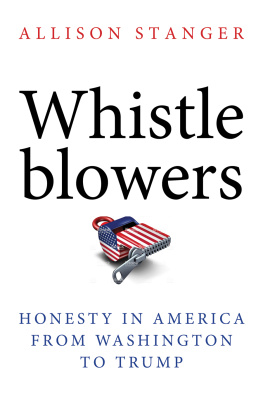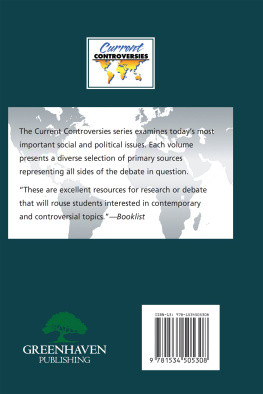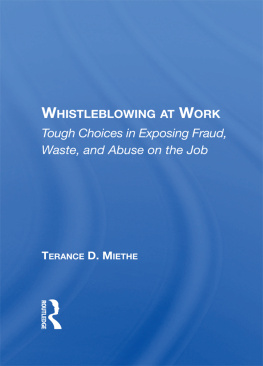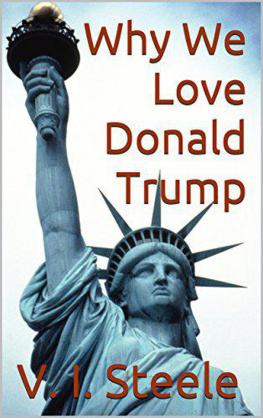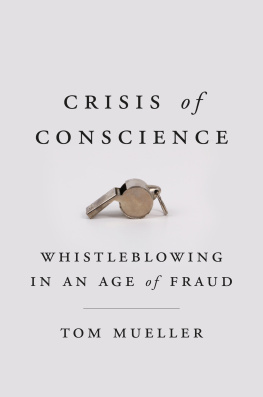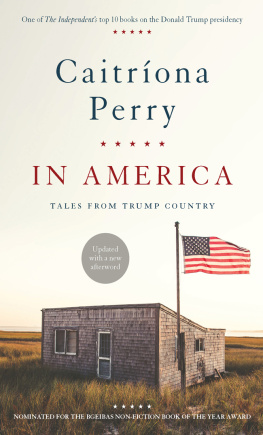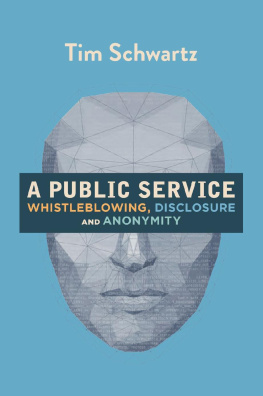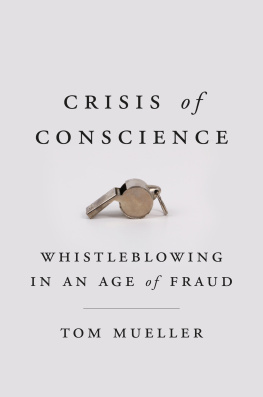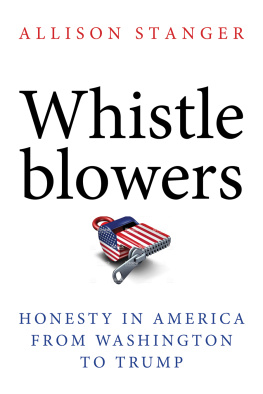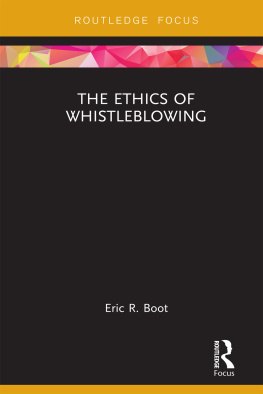WHISTLEBLOWERS

Published with assistance from the foundation established in memory of James Wesley Cooper of the Class of 1865, Yale College.
Copyright 2019 by Allison Stanger.
All rights reserved.
This book may not be reproduced, in whole or in part, including illustrations, in any form (beyond that copying permitted by Sections 107 and 108 of the U.S. Copyright Law and except by reviewers for the public press), without written permission from the publishers.
Yale University Press books may be purchased in quantity for educational, business, or promotional use. For information, please e-mail (U.K. office).
page v: From James Baldwin, As Much Truth as One Can Bear, New York Times, January 14, 1962. Reprinted with permission from the James Baldwin Estate.
Set in Janson Text and Janson Antiqua types by IDS Infotech Ltd.
Printed in the United States of America.
Library of Congress Control Number: 2019933343
ISBN 978-0-300-18688-8 (hardcover : alk. paper)
A catalogue record for this book is available from the British Library.
This paper meets the requirements of ANSI/NISO Z39.48-1992 (Permanence of Paper).
10 9 8 7 6 5 4 3 2 1
The whole art of government consists in the art of being honest.
THOMAS JEFFERSON , 1774
Not everything that is faced can be changed; but nothing can be changed until it is faced.
JAMES BALDWIN , 1962
Contents
WHISTLEBLOWERS
Introduction
The Paradox
We are unknown to ourselves, we knowers, and with good reason. We have never looked at ourselves.
FRIEDRICH NIETZSCHE , 1887
W HISTLEBLOWER RIGHTS AND PROTECTION in the United States are as old as the republic itself. In 1777, during the Revolutionary War, ten American naval officers revealed that their commodore, Esek Hopkins, had tortured captured British sailors. They submitted a petition to the Continental Congress alleging that Hopkins had treated prisoners in the most inhuman and barbarous manner. Congress voted to remove Hopkins from his position, and Hopkins retaliated by accusing two of the whistleblowing sailors of libel and having them arrested.
The imprisoned whistleblowers, Richard Marven and Samuel Shaw, petitioned Congress to secure their release from prison. Congress ruled in their favor and in response to the situation issued the worlds first whistleblower protection law on July 30, 1778. Its language captures the intimate relationship that the founders perceived between the upholding of whistleblower rights
Congress did not stop at upholding whistleblowing. Although the country was at war and strapped for resources, Congress paid the legal fees of Marven and Shaw. Congress also passed a law to ensure that future whistleblowers would have legal counsel to fight libel charges. In a final demonstration of its convictions, Congress authorized that all records related to Hopkinss removal be released to the public. Thus, even before the Constitution became Americas basic law, the importance of whistleblowing as a means of exposing important truths was part of the new nations DNA. Ideals and practice, however, would too often diverge.
What Is Whistleblowing?
Whistleblowing has been present since the United States founding, but the concept means different things to different people. To have a meaningful national conversation on whistleblowing, we have to start with a common definition, stripped of partisan leanings. That is the only way to see what has changed and what hasnt in the treatment of American whistleblowers.
For starters, just thinking oneself a whistleblower isnt enough. A whistleblower cannot be defined as an advocate for the change Id like to see. That definition confuses whistleblowing with political activism, and it invites partisan interpretations. The usually precise Oxford English Dictionary, showing an awareness of this confusion, skirts it with a circular definition: a whistleblower is one who blows the whistle on a person or activity, especially from within an organization. The Cambridge Dictionary definition is narrower: a whistleblower is a person who tells someone in authority about something they believe to be illegal that is happening, especially in a government department or a company.
The Whistleblower Protection Act of 1989, which was strengthened in 2012 through the Whistleblower Protection Enhancement Act, comports with the Cambridge definition.
Federal employees who disclose illegal or improper government activities are protected from supervisors or coworkers retaliation.
The MSPBs reasonable belief standard depends on an evidence-based, nonideological approach to determining the truth. For our purposes, a whistleblower is an insider (meaning an employee, customer, auditor, or other stakeholder) who has evidence of illegal or improper conduct and exposes it, either to the authorities or to the press. In government, improper conduct is illegality or a violation of constitutional norms. In the corporate world, it is illegality or the violation of company norms. Put another way, whistleblowers draw attention to self-interested actions that undermine public trust. They often reveal misconduct involving the use of public power for private gain, otherwise known as corruption.
Whistleblowers thus betray their organization or its leaders in service of the truth. Their motives for doing so are irrelevant. Most are heroic. Some are saving their own skin. In the heat of the moment, motives can be impossible to identify with accuracy. Motivation is thus somewhat important but not definitive, especially in the corporate realm, where current law gives whistleblowers a share of the money recovered from a successful suit. That is why the main focus should be on whether behavior exposed is illegal or shameful.
Comparing this definition with partisan alternatives brings into fuller relief the vital role truth telling plays in sustaining civil discourse and American constitutional democracy. Whistleblowing is not merely a weapon for advancing partisan or personal interests in a fake-news world. Its purpose is not to denigrate others or vindicate our own political biases. The extreme Left and Right may view any revelation of secret information as whistleblowing, but that definition blurs important lines. All whistleblowers are leakers, but not all leakers are whistleblowers. Leakers expose secrets, but secrets are not always a cover for misconduct, even if their revelation can often embarrass individuals and destroy careers. Whistleblowers expose lies and wrongdoing.
Equally, dissent is not the same as whistleblowing. All whistleblowers are certainly dissenters in that they refuse to accept current circumstances, but all dissenters are not whistleblowers. Whistleblowers reveal truths that the powerful do not want to be made public, whereas dissenters simply disagree.
Whistleblowing is a cousin of civil disobedience, but they are not one and the same. For Hannah Arendt, Civil disobedience arises when a significant number of citizens have become convinced either that the normal channels of change no longer function... or that, on the contrary, the government is about to change and has embarked upon and persists in modes of action whose legality and constitutionality are open to grave doubt. Civil disobedients break laws that they want to see changed. In this sense, like whistleblowers, all civil disobedients are dissenters, but all dissenters are not civil disobedients. Yet whistleblowers differ from civil disobedients in that they appeal to the law or the Constitutionto the American rule-of-law traditionfor justice, whereas civil disobedients challenge the legitimacy of existing laws. Both variants of dissent require political judgment.
Next page
